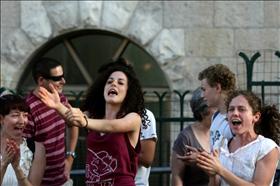Kol Isha
91% of Jewish religious population: Gender segregation is distortion of Judaism.
According to a survey by the Smith Institute for Hiddush, 89% of the Jewish public in Israel sees recent controversies over gender segregation in the streets of Mea Shearim and on bus lines as a distortion of Judaism (42%) or extremely unnecessary (47%).
10/11/2011 15:35
Tags: Segregated buses · Mea Shearim · Jerusalem and Haredim · Army and gender · Gender discrimination · Polls

Secular women singing and dancing opposite a haredi shabat demonstration in Jerusalem. 23.07.2011. Photograph by: Kobi Gideon, Flash 90.
Recent news in Israel has shown extreme escalation in the exclusion of women from the public sphere. Advertisers have been bullied to take women off of their posters for fear of insulting their ultra-Orthodox clientele who believe it to be immodest, streets in ultra-Orthodox areas have been forcibly gender-segregated against the law, and female soldiers’ rights have been called into question.
89% of the Jewish public in Israel sees recent controversies over gender segregation in the streets of Mea Shearim and on bus lines as a distortion of Judaism (42%) or extremely unnecessary (47%). Only 11% of the Jewish population believes that gender segregation reflects “authentic Judaism”. Interestingly, 91% of the religious population who is not ultra-Orthodox sees this gender segregation as a distortion of Judaism (78%) or extremely unnecessary (13%). 35% of the ultra-Orthodox population also views this degree of segregation negatively.
The objection to this gender segregation is common to voters of all civil parties. 91% of Likud voters view gender segregated bus lines and gender segregated streets in Mea Shearim as a distortion of Judaism (46%) or extremely unnecessary (45%). This is true of 94% of Kadima voters, 95% of Israel Beiteinu voters, and 98% of Labor voters.
The public sees this erasure as a perversion of Judaism, and does not want to see an extremist, archaic movement backward against the rights of women.
These numbers are according to a survey conducted by the Smith Institute for Public Opinion for Hiddush – Freedom of Religion in Israel. The research was conducted in early November 2011 with a sample of 500 people from the adult Jewish population of Israel.
The struggle of the exclusion of women in public spaces is ever-growing. CEO of Hiddush, Rabbi Uri Regev said “This survey clearly shows that there is clear opposition to trying to erase women from public spaces, advertisements, culture and entertainment in Israel. The public sees this as a perversion of Judaism, and does not want to see an extremist, archaic movement backward against the rights of women.”
Regev continues “Now that former Mossad Head Efraim HaLevy has declared religious radicalism more dangerous to Israel than Iran, it is time the leaders of the major parties do what the public expects of them and establish a civil government to stop this escalation.”
Shahar Ilan, Hiddush’s Vice President, speaks out against gender discrimination against pictures of young girls on stickers here
Hiddush CEO Rabbi Uri Regev discusses the battle in Jerusalem to keep women visible here